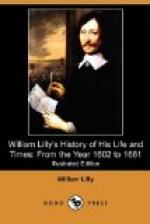OF MY MARRIAGE THE FIRST TIME.
My mistress, who had been twice married to old men, was now resolved to be couzened no more; she was of a brown ruddy complexion, corpulent, of but mean stature, plain, no education, yet a very provident person, and of good condition: she had many suitors, old men, whom she declined; some gentlemen of decayed fortunes, whom she liked not, for she was covetous and sparing: by my fellow-servant she was observed frequently to say, she cared not if she married a man that would love her, so that he had never a penny; and would ordinarily talk of me when she was in bed: this servant gave me encouragement to give the onset: I was much perplexed hereat, for should I attempt her, and be slighted, she would never care for me afterwards; but again, I considered that if I should attempt and fail, she would never speak of it; or would any believe I durst be so audacious as to propound such a question, the disproportion of years and fortune being so great betwixt us: however, all her talk was of husbands, and in my presence saying one day after dinner, she respected not wealth, but desired an honest man; I made answer, I thought I could fit her with such a husband; she asked me, where? I made no more ado, but presently saluted her, and told her myself was the man: she replied, I was too young; I said nay; what I had not in wealth, I would supply in love; and saluted her frequently, which she accepted lovingly; and next day at dinner made me sit down at dinner with my hat on my head, and said, she intended to make me her husband; for which I gave her many salutes, &c.
I was very careful to keep all things secret, for I well knew, if she should take counsel of any friend, my hopes would be frustrated, therefore I suddenly procured her consent to marry, unto which she assented; so that upon the eighth day of September, 1627, at St. George’s church in Southwark, I was married unto her, and for two whole years we kept it secret. When it was divulged, and some people blamed her for it, she constantly replied, that she had no kindred; if I proved kind, and a good husband, she would make me a man; if I proved otherwise, she only undid herself. In the third and fourth years after our marriage, we had strong suits of law with her first husband’s kindred, but overthrew them in the end. During all the time of her life, which was until October, 1633, we lived very lovingly, I frequenting no company at all; my exercises were sometimes angling, in which I ever delighted: my companions, two aged men. I then frequented lectures, two or three in a week; I heard Mr. Sute in Lombard-Street, Mr. Gouge of Black-Fryars, Dr. Micklethwait of the Temple, Dr. Oldsworth, with others, the most learned men of these times, and leaned in judgment to Puritanism. In October, 1627, I was made free of the Salters’ company in London.




